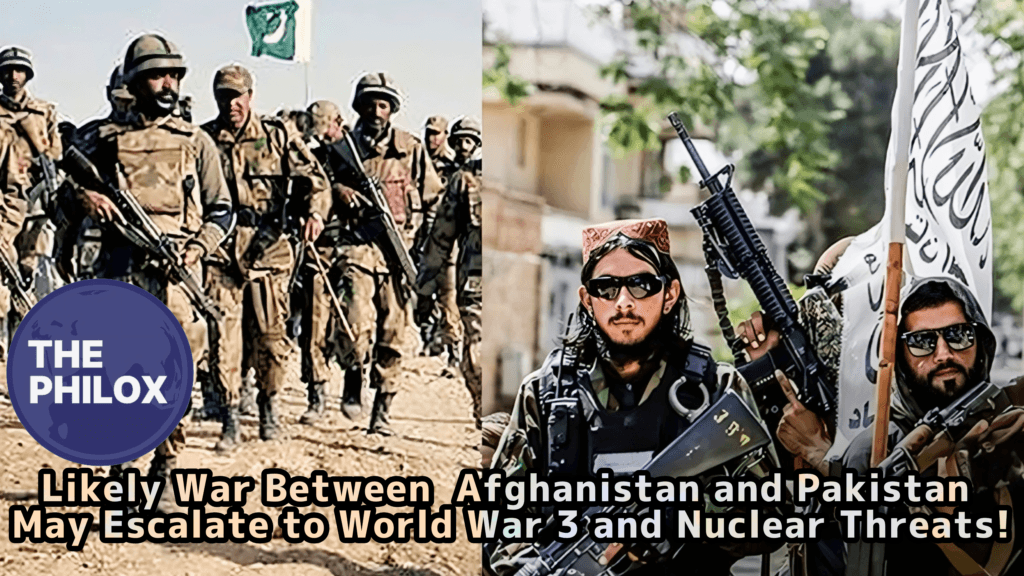
Likely War Between Afghanistan and Pakistan
Afghanistan and Pakistan are neighbors in South Asia, having a complex history characterized by politics, ethnicity, and territorial issues. This has significantly influenced regional dynamics.
One of the main points of contention is the Durand Line, established in 1893 as part of British colonial rule, dividing ethnic Pashtun tribes between the two countries. Afghanistan has long contested this demarcation, creating continuous border tensions.
The relations between Pakistan and Afghanistan have also been further strained due to the Taliban movement that rose in Afghanistan at the turn of the late 20th and early 21st centuries, reportedly having received support from some elements of Pakistan’s security establishment.
The role played by Pakistan in Afghanistan’s internal affairs, especially during the Soviet-Afghan War and its aftermath civil wars, is another controversial matter.
To add further complexity, were the invasion of Afghanistan by the United States in 2001 and the consequent War on Terror.
Both sides experienced problems pertaining to terrorism, militancy, and refugee flows; accusing the other of allowing hostile elements to exist and flourish.
The Taliban’s resurgence and the activities of groups like Tehrik-i-Taliban Pakistan (TTP) have once again ignited tensions in recent years.
Cross-border militancy and military engagements have increased, thereby increasing distrust and instability in the region.
Recent Developments
Border Clashes
Border clashes between the Afghan and Pakistani forces have gained momentum over the past months.
In December 2024, the Pakistani armed forces conducted airstrikes inside Afghanistan’s Paktika province targeting what they claimed as terrorist hideouts.
The airstrikes reportedly killed several civilians, including women and children, raising tension between the two nations.
Diplomatic Tensions
Border skirmishes have stalled the diplomatic communication. Afghanistan’s Foreign Ministry summoned Pakistan’s charge d’affaires in Kabul to protest the airstrikes, terming it as an attack on Afghan sovereignty.
Pakistan’s response came in the form of accusations against Afghanistan to provide shelter to militant groups responsible for attacks within Pakistan borders.
nuclear arsenal of Pakistan
Pakistan is a nuclear weapon state with an established nuclear arsenal developed as a deterrent primarily against India.
Estimates suggest that Pakistan has around 165 nuclear warheads. Ballistic missiles and aircraft provide delivery systems.
There are latest reports which indicate that Pakistan has started developing long-range ballistic missiles. This causes serious concerns for the strategic intent beyond regional deterrence.
Afghanistan
Afghanistan does not have nuclear weapons and has strongly promoted the cause of nuclear non-proliferation. The Afghanistan government has voiced its concerns over the nuclear weapons in the region, underlining the vision for peaceful coexistence and regional stability.
Statement and Threats
Official Statements
Till date, no official statement by the leaders in Pakistan has been made with an intention of using nuclear weapons against Afghanistan.
However, with an increase in the level of conventional engagements and with the advanced missile capabilities that have emerged, the concerns of a wider conflict are growing.
Response from Afghanistan
The Afghan government has condemned Pakistan’s military actions within its territory, warning that such aggression could lead to severe consequences. Afghan officials have called for international intervention to prevent further violations of their sovereignty.
International Reactions
Global Concerns
The international community feels that the deterioration in relations between Afghanistan and Pakistan is alarming and growing.
An emerging threat comes from Pakistan expanding its missile capabilities, which had been described recently by the U.S. itself as a dangerous development, meaning changed strategic priorities;
regional super-powers China and Russia have jointly called for restraints and dialouge over the issue lest the situation worsens for the region
United Nations stance
The United Nations has condemned the civilian casualties in the airstrikes, which it is concerned over.
UN agencies such as UNICEF have addressed the humanitarian situation arising from the conflict, focusing more on the impacts on women and children, and have called for an immediate halt to hostilities and respect for international humanitarian law.
Humanitarian Impact
A full-scale war between Afghanistan and Pakistan would be disastrous in terms of humanitarian consequences. The two countries are likely to bear heavy civilian casualties, displacement, and destruction of infrastructure.
The recent airstrikes killing civilians are a stark reminder of the human cost of military action on the rise.
Regional Stability
It would likely send the entire region of South Asia into pandemonium due to the weaponized nature of the Afghanistan and Pakistan conflict.
The situation might get worse because some circumstances, which are already tensioned up-especially those which involve India and even may entice other regional powers leading into a more horrific catastrophe.
Having long-range missiles from Pakistan add another level of complexity in securing the situation due to the tendency of creating a race for weaponry in the area.
Historical Background
Former Conflicts
Afghanistan and Pakistan have always been involved in skirmishes over border disputes and also accusing each other of supporting the opposing group of insurgents.
The Durand Line was the still point of conflict between these nations as they used to clash each other from time to time to claim its validity and security.
Nuclear Policies
Pakistan’s nuclear doctrine is largely India-centric, and its nuclear weapons are targeted at deterring its eastern neighbor. However, the development of long-range ballistic missiles may indicate a change in strategic intent.
There has never been a nuclear threat between Afghanistan and Pakistan in the past, but the current situation is a cause for concern regarding the possibility of miscalculation.
Efforts at De-escalation
Diplomatic Initiatives
However, diplomatic channels remain open with all this tension. Recent talks between Afghan and Indian officials show eagerness to communicate with each other to talk over the security and economic issues.
Stay Connected and Share Your Stories
For all those inspired by stories of resilience and ambition, follow us on X/Twitter and on Instagram . For those with untold stories that you would love to share, please send them to contact@thephilox.com
4 thoughts on “Likely War Between Afghanistan and Pakistan May Escalate to World War 3 and Nuclear Threats”